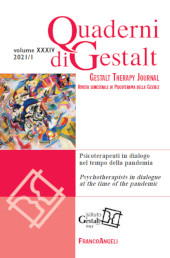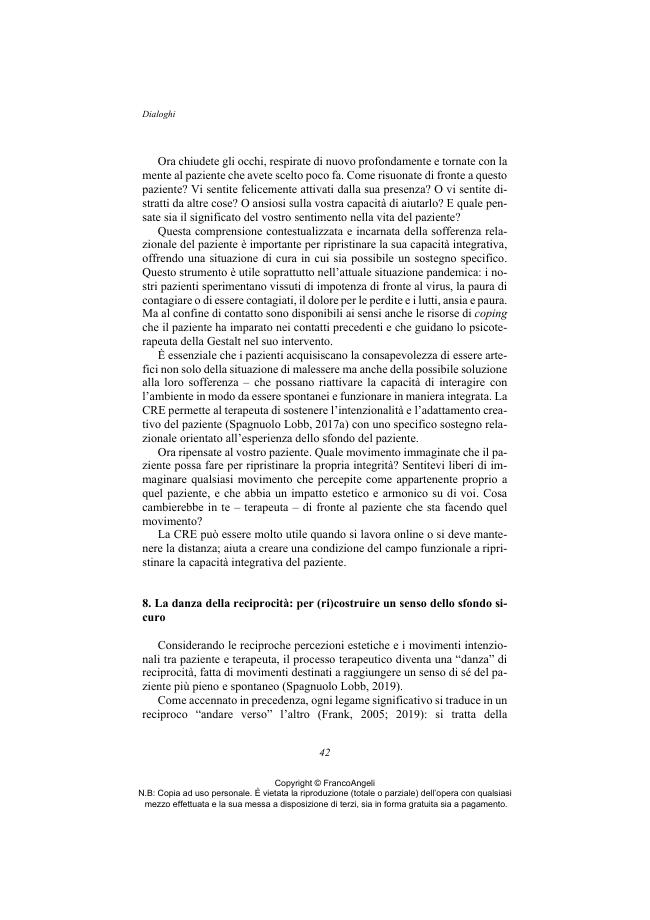Essere psicoterapeuta della Gestalt al tempo del Coronavirus : percepire lo sfondo esperienziale e "danzare" con reciprocità
33-50 p.
Partendo dalle esperienze sociali che hanno fatto da sfondo alla pandemia, sono descritte alcune delle dimensioni relazionali che sono venute in figura oggi. L'autrice sostiene la necessità di fare evolvere i valori delle psicoterapie umanistiche, dal sostegno al potenziale individuale alla costruzione di un senso di "esserecon" l'altro, abbracciando una prospettiva più relazionale. Propone di guardare al paradigma della reciprocità, applicato attraverso un approccio estetico e ispirato all'ermeneutica gestaltica (fenomenologica e di campo), e presenta la Conoscenza Relazionale Estetica (Spagnuolo Lobb, 2017a) come un mezzo per lavorare sulla sofferenza del paziente in modo contestualizzato, considerando la risonanza del terapeuta come parte del campo esperienziale che si crea nel setting terapeutico.
Questo nuovo valore umanistico può essere realizzato concentrandosi sulla "danza" della reciprocità tra terapeuta e paziente (un modello in fase di ricerca che considera le reciproche percezioni e reazioni alle percezioni dell'altro, sostenute dalla vitalità che ciascuno pone nell'esserecon l'altro). In questo modo, il cambiamento terapeutico può includere sia esperienze in figura che dello sfondo. Una conseguenza di questo nuovo valore è una svolta nella posizione etica dello psicoterapeuta: da uno sforzo narcisistico di essere un "buon terapeuta" ad un atteggiamento estetico che non nega i limiti e mette in primo piano la presenza dell'altro. Una conseguenza importante per i terapeuti è quella di prendersi cura di se stessi per essere in grado di affrontare il trauma della pandemia, cosa che si realizza anche attraverso un dialogo costante nella comunità professionale. [Testo dell'editore].
Building on the social experiences that have formed the backdrop to the pandemic, some of the relational dimensions that have come to the forefront today are described. The need for a new set of values in humanistic psychology is addressed, from support for individual potential to building a sense of "beingwith" the other, embracing a more relational perspective. The author proposes looking to the paradigm of reciprocity, applied through an aesthetic approach and inspired by gestalt hermeneutics (phenomenological and field oriented), and presents aesthetic relational knowledge (Spagnuolo Lobb, 2017a) as a means of working through the suffering of the client in a contextualized way, considering the resonance of the therapist as part of the experiential field of the client.
This new humanistic value can be realized by focusing on the "dance" of reciprocity between the therapist and the client (a model under research that considers mutual perceptions and reactions to the perceptions of the other, supported by the vitality that each one places in beingwith the other). In this way, therapeutic change can include both figure and ground experiences. A consequence of this new value is a turn in the ethical position of the psychotherapist: from a narcissistic effort to be a "good therapist" to an aesthetic attitude that doesn't deny limits and puts the presence of the other in the foreground. An important consequence for therapists is to take care of themselves so that they are able to deal with the trauma of the pandemic, which is also strengthened through constant dialogue with the professional community. [Publisher's text].
-
Artikel aus derselben Ausgabe (einzeln erhältlich)
-
Informationen
ISSN: 2035-6994
KEYWORDS
- Coronavirus, conoscenza relazionale estetica, psicoterapia della Gestalt, reciprocità, valori umanistici
- Coronavirus, aesthetic relational knowledge, gestalt therapy, reciprocity, humanistic values



